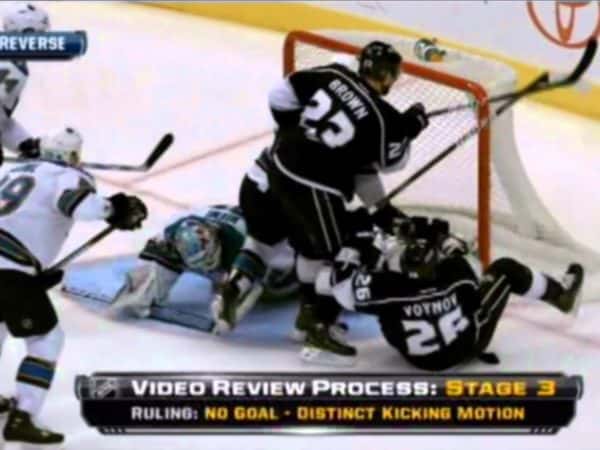
 Is the NHL’s goal review taking too long?
Is the NHL’s goal review taking too long?
You’re tired of the slow pace of baseball so you sit down to watch a little NHL hockey. Angry, bearded men on steel blades hitting each other at thirty kilometres an hour and slapping around a rubber disc at 100 kilometres an hour, that will satisfy your need for speed and aggression, right?
Sure it will. At least until someone scores, or maybe doesn’t score, and all the excitement is drained from the building by a lengthy goal review. Then, for what seems like an hour, we are treated to a Zapruder-film like dissection of the incident (Crosby’s skate goes away and to the left) until we are thinking about lacrosse, curling, “Eat Pray Love” -anything else.
Well it turns out that the players on the ice are feeling the same way you do.
On Thursday, San Jose Shark defenseman Brenden Dillon had what would have been his first goal of the season taken away by a video review which revealed that the Sharks were offside on the play. After the game, however, the 25 year-old former Dallas Star wasn’t complaining about the call. He was complaining about how long it took to make it.
“They obviously have to tweak a couple things,” Dillon said. “Whether, hey, it’s a five-minute window. If you can’t find enough evidence in that five minutes, or that three minutes, which would be preferable for us players, instead of having your goalie sitting around.”
Dillon joins a growing chorus of hockey people who think the video review process is hurting the game. TSN’s Gary Lawless, who covers the Winnipeg Jets, recalls a recent offside review that took more than nine minutes to settle. He agrees with Dillon about imposing a time limit, and notes that the NHL currently does not time the reviews, leading to a frustrating experience for fans.
“Optics play a part here and when a rink full of people as well as a TV audience are focused on a linesman staring at a 10-inch screen for a number of minutes listening to all three verses of Stompin Tom’s The Good Old Hockey Game and some excruciating in-house promo, the game loses steam and people question the process,” he says.
The video review process has been under fire since the coach’s challenge was introduced last year. The new rule, which is limited to goals scored on potential offside or goalie-interference plays, was supposed to eliminate the “egregious” errors in the game, but some say there is already enough evidence to suggest it should be scrapped. It seems some of these critics actually work for the National Hockey League.
“You want to use video replay to get egregious plays, not close calls where it’s 50-50,” says Mike Murphy, the NHL’s VP of hockey operations. “[Coaches] can live with some of the close plays that happen in our sport. It’s what make our sport so great. It travels so fast. The reason we instituted it was so that we could get the egregious calls particularly right, ones that everybody alive sees and says, ‘This is the wrong call, it’s a screw-up.”
Is there technology that could help the NHL? Yes and no. One system called Hawk-Eye is currently being used in cricket and tennis and was adopted by the English Premier League in 2013. The Hawk-Eye system uses more than a dozen cameras to triangulate the position of an object and can send a signal to a device worn by a referee within one second. As the folks at Physics.org explain, the system actually has a margin of error of just 2.6 millmietres, surely accurate enough to make a goal line hockey call.
But there is a problem with using Hawk-Eye in the NHL. Murphy says there are just too many bodies and too much equipment in the way for it to work as well as it does in tennis or in soccer.
It seems the answer lies in a microchip within the pucks themselves, but that technology has yet to be perfected for the NHL usage case.
“Anything we’ve ever tested, that hasn’t worked,” Murphy said. “For whatever reason the dynamics of the puck, altering the state of the puck has been a problem. The players haven’t liked the way it’s performed.”
But it seems like just a matter of time before someone does perfect puck tracking technology. TSN’s Darren Dreger says the NHL is currently putting resources toward that goal.
“Whether it’s a chip in the puck that prompts a computer analysis or something more high-tech or complex is unclear, but what is known is the NHL’s tech gurus are working on the issue,” says Dreger. “Sources say that while there has been some on-ice testing, the technology being worked on is not at a stage where it is near game ready and there is no sense when it might be.”
What this all means is that one day soon the NHL’s current video review system will seem as anachronistic as wooden sticks, using Eaton’s catalogues as shin pads or, I dunno, the FoxTrax Glow Puck.
Leave a Reply
You must be logged in to post a comment.



 Share
Share Tweet
Tweet Share
Share




Comment